13th December 2021
The Spokesmen Cycling Podcast
EPISODE 288: Why is anti-roads campaigner John Stewart against LTNs?
SPONSOR: Jenson USA
HOST: Carlton Reid
GUEST: John Stewart, Chair of Campaign for Better Transport and UK Noise Association and a long time anti-roads campaigner
TOPICS: Veteran nti-road campaigner John Stewart is anti-LTN: why?
LINKS:
John Stewart’s article in The Telegraph:
TRANSCRIPT:
Carlton Reid 0:15
Welcome to Episode 288 of the Spokesmen cycling podcast. This show was recorded on Monday 13th of December 2021.
David Bernstein 0:25
The Spokesmen cycling roundtable podcast is brought to you by Jenson, USA, Jenson USA where you will find a great selection of products at unbeatable prices with unparalleled customer service. Check them out at Jensonusa.com/thespokesmen. Hey everybody, it’s David from the Fredcast. And of course, I’m one of the hosts and producers of The spokesmen cycling roundtable podcast since 2006. For shownotes links and other information, check out our website at the-spokesmen.com. And now, here’s my fellow host and producer Carlton Reid and the spokesmen.
Carlton Reid 1:10
Hi, I’m Carlton Reid and today’s show is an interview with veteran anti roads campaigner John Stewart. He’s been causing a fuss on social media over his controversial views on low traffic neighbourhoods or LTNs. Controversial because of his long history of campaigning against motor traffic, and also because he’s the chair of the Campaign for Better Transport. Now, he penned a polemic in yesterday’s Sunday Telegraph, which was headlined, “LTNs are ineffective, and inherently infai.” Rather than engage with him on Twitter, as many have done and I was kind of going to, I thought I’d get him on the show. And as you’ll hear in this episode, which is just shy of an hour, we establish he’s not against LTNs which push motor traffic onto motor roads. But those which he says, push motor traffic onto boundary roads, and where many people live. Now I do in this episode, talk about many studies, which show the opposite. But anyway, here is John Stewart.
I want to get into your background in a minute, because it does appear that we we share many interests, and probably we know very much the same people. But you have made this argument that has led to an awful lot of heat and light on on on Twitter just recently, and in the Telegraph, where you wrote an article that has definitely got people up in arms and wondering why somebody who’s an environmentalist can be making these kind of arguments. So I’d like to explore that I’d like to explore why you’re making those arguments. But first of all, let’s go into your background. So let’s let’s let’s show people that you know you’ve got some bonafides is here in the fact that you’ve you’ve been campaigning against cause and effect and certainly ramp and room road building for many, many years. So tell us first of all, your current role in this field, and then let’s go to your history.
John Stewart 3:23
Okay, the current role is I’m a bit of a freelance campaigner these days, Carlton, but I do chair both the UK Noise Association and Campaign for Better Transport. I have also done fairly recently, a lot of work on aviation issues, aviation noise, and then let’s go to your history then. Because I mean, I’m you you one of the organization’s you chaired, and when this is the late 80s 90s was the all London against the roadbuilding menace, so alone, which was basically a consortium of groups. Yeah, it was it was That’s right cause and that’s, I got involved in a campaign for public transport as a local level in South London. And then we across London, we were hit with these proposals for a £13 billion programme, to update
to upgrade roads to build new highways. And of course, that would have caused a lot of destruction, many people’s homes would have gone, parks would be decimated. And this organisation with a wonderful name All London against the roadbuilding menace — alarm — was formed. It essentially was a network of eventually 250 local groups across London, which I which I helped bring together and which I chaired. And we were actually successful. We wrote all the roadbuilding schemes proposed in the programme were dropped, ironically, just before the local elections in London in 1990. Because I think the government of the
day realised that it was good to lose heavily on this issue on this issue alone.
Carlton Reid 5:04
So we’re going to thank you for that, because that clearly would have been genuinely a menace if that had come through. So you that you’re now chairing Campaign for Better Transport. So we’re back explain, I get that. I sort of almost know that better as Transport 2000. Because it’s an early 1970s organisation. So were you also a chair of Transport 200? So how long have you been involved with with this group?
John Stewart 5:31
I’ve been involved with Transport 2000, you’re quite right. It was called transport 2000. Until what sort of the year 2000 Colton. We tried to change the name and in the year 2000, but the members were having none of it. So we struggled on beyond 2000 for transport 2000 And then came up with this terribly compromised, somewhat boring name Campaign for Better Transport, which could really mean anything at all. I’ve actually been involved with it since since the late 1980s. But it’s only in the last. And I chaired it for a short while in the early 2000s. But it’s only recently that I’ve taken on a more full time role. Or yeah, it’s a much more upgraded role in sharing it over the last couple of years.
Carlton Reid 6:20
So you could name drop here with like Michael Palin. Jenny Agutter.
John Stewart 6:25
I can. I’ll tell you a story about Michael Palin, my niece and nephew who were about seven or eight at the time. And of course, they thought their uncle was dreadfully old fashioned because he couldn’t do any of this new technology on computers and things which was just meat and drink to them. I was his old fashioned uncle who came up to Edinburgh from time to time. And then suddenly, they discovered I had met Michael Palin, and everything and everything changed. I was I was a new cool uncle who technology didn’t really matter that he couldn’t do it. So yes, I mean, Michael Palin who was president of Transport 2000 and Campaign for Better Transport for quite some time and actually a very effective and very engaged President.
Carlton Reid 7:11
Explain what the Campaign for Better Transport argues for? Because it was founded by a railway union in effect. So So is it buses and trains? And, and, and that mainly, or has it always encompassed bicycling? Where do you think it stands in, in, in the in the pantheon of organisations?
John Stewart 7:35
Well, you’re quite, you’re quite radical. It was founded in the 1970s, initially, but the real unions and then the old British Rail came on board. And the idea was, and both of them saw, although they had differences amongst themselves, they saw the value in an independent body, making the case for rail. So opening doors that they couldn’t open. So initially, it was a rail body then moved into other forms of public transport. It has tried to take a holistic view on transport, pushing all the time for sustainable transport. But I think over the years is probably done less on walking and cycling, mainly because there were other organisations which specialised in walking in cycling, and it was you know, when you’re an NGO, you want to focus on the areas where perhaps nobody else is campaigning.
Carlton Reid 8:27
So then you’ve got something like this and you can name drop here again with with Stephen Joseph, a very well known person in this fear. So you had Stephen there. I mean, he has pushed the bicycling and walking message a lot more, hasn’t he?
John Stewart 8:40
He most certainly has. I’m certainly in the in the 1990s with Stephen Joseph there and Lynn Sloman is as deputy
Transport 2000 as it was then was making yes was making considerable waves on on walking and cycling and Stephens a bit of a legend in the transport world. He was the chief executive of Transport 2000 for 30 years. And actually it was very, very keen as really as the organisation to take a realistic view on things so that walking in cycling is as important as public transport except perhaps these days with a little bit less work on it, simply because other organisations specialise in it.
Carlton Reid 9:21
And then you mentioned Lynn Sloman, there again, Lynn Sloman is a very well known person in this sphere. Am I right in saying you’re an associate of her Wales-based organisation transport consultancy?
John Stewart 9:35
I am I
again, I’ve known him for a long time and I’m an associate of her of her consultancy, which you probably know Carlton, it does a lot of fairly traditional work of modelling work for the Department for Transport, local authorities and other organisations, but it also tries to push a radical approach
radical solutions to the transport problems that we face.
Carlton Reid 10:04
And then I’m building up your bonafides here, John,
John Stewart 10:08
You’ve got to keep going.
Carlton Reid 10:09
I’m researching you so Slower Speeds Initiative and RoadPeace again two key organisations in this in this world, so you’ve chaired them as well. So you’ve knocked around a bit, John.
John Stewart 10:23
I have I have indeed, yes, in the 1990s. RoadPeacejust started as an organisation set up by the wonderful Briggita Chaudry, whose son was tragically killed in a road crash, she set it up, and she established it as a national organisation. And she also established international organisations for road traffic victims in the early 1990s. So she was looking for people who had,
who worked mothers and fathers and brothers and sisters of road traffic victims, but who had some knowledge of road transport and road danger. And initially, I came into the road data Working Party, which they set up. But then Shortly afterwards, the the chair of road peace moved on. And I chaired road peace for about six years in the in the 1990s. And that kind of led in the late 1990s, to the formation of the slow speech initiative, which brought together road peace, a number of other organisations concerned with road safety, people like Meyer Hillman and
others. And I chaired that. And I think one of the interesting things Carlton is that, you know, there there in the late 1990s, we were pressing for things like a 20 mile per hour speed limit to be the norm and built up areas. We weren’t really getting anywhere. But now, thanks for the work of Rob King and others, it is becoming the norm in built up areas is becoming the norm in Scotland and Wales in many of English cities. And I think one of the lessons, one of the things that tells me is that even if you’re not getting somewhere as a campaigner, keep going, don’t despair, because 20 years later, your work may see, bear fruit.
Carlton Reid 12:12
Mayer Hillman, certainly like carbon credits, all that kind of stuff. He was way ahead of the the field on that one.
John Stewart 12:19
He was he was indeed. I mean, the other thing I did in the 1990s was an extension of alarm in London, which was,
which was something called Alarm UK, as you may know, in 1989, the government of the day boasted it was it was building the biggest road building programme. Since the Romans, it had dropped London, but it was moving on to the rest of the country. Now, it wasn’t quite we didn’t quite say we’ve done London, let’s go, let’s go, let’s go national. But a lot of people and local groups from around the country approached us and said, Look, you want a few people win against roadbuilding schemes, can you give us some assistance. So myself and a few others set up alarm UK in 1990, and eventually did about 300 local groups across the country, each opposing roadbuilding schemes, and with some success of the 600 Odd schemes that were proposed in 1989.
Only about 160 of them were left. By the time the Labour government came in in 1997. And most of the most of the ones that weren’t most of them had been dropped. There were very few still left as live schemes. So that wasn’t that was a very interesting experience at the time of Twyford Down and everything else like that. Hmm.
Carlton Reid 13:44
So, Johh, we’ve totally established your bonafidesin this this area. I’m sure lots of people listening to this will be nodding at home. And just going Yes, yes, yes. Yes. All of this is exactly what I agree with, etc. And then what
isn’t on people’s radar? Because obviously people think of LTNs low traffic neighbourhoods as a good thing. There are other opinions out there that maybe challenge that opinion. You have challenged that opinion.
John Stewart 14:15
Absolutely.
Carlton Reid 14:16
Now, let’s go before go into the telegraph piece, would it? Would I be right in thinking that it was originally the tweet from @cutnoise? So from the UK noise Association?
John Stewart 14:28
Yep.
Carlton Reid 14:29
Which with that got a lot of heat and light about 10 days ago. I remember seeing that kind of flaring up did that did the telegraph piece come from that?
John Stewart 14:38
I think it did. I mean, I The Telegraph approached me and I think they’d seen that piece. And they’ve seen that react the reaction to it on Twitter, and they explored with me well, I’ll be interested in writing a common piece of the newspaper. Yeah, I kind of assumed I just assumed that might be the case because I remember it bubbling up and then it kind of died.
Carlton Reid 15:00
again and then this came this came in The Telegraph yesterday, The Sunday Telegraph, it’s like, that’s a very similar argument or argumentation to, to that when and then you’re clearly you’re a chair of this organisation too. So I kind of link the two things. So without wanting to completely
say word for word what was in the Telegraph? Can you just give us the thumbnail sketch of how you would pitch your your article that you wrote for The Telegraph?
John Stewart 15:31
Well, you’re quite right, Carlton somebody like me, and I said this at the beginning of the article, for the Telegraph, should be a great fan of low traffic neighbourhoods, they should be my Garden of Eden, my Nirvanna.
quiet, peaceful, very few cars. And they are great places no question about it. And the quality of life for most of the residence has increased no end.
My concern, and it’s a concern that goes back some years before the recent batch of low traffic neighbourhoods, but But my concern is, where is that traffic going? Now, we know some of it is disappearing because people are not using their cars and as quite as much as they did. But a lot of it is going on to the adjacent main roads, the adjacent boundary roads. And from noise perspective, from an air pollution perspective. The main roads are the roads, which were the noise problems, and the air pollution problems are greatest. And I had real difficulty in any scheme, however good it is for the residents within that scheme, putting yet more traffic onto the main roads. So that was the concern. That was that was really the pitch to the Telegraph. And I think they they quite liked what I had to say. I think, to add to that, there, there is this fear this feeling and I think it’s probably right, that on many of the main roads, the objections
have come from
a new quarter. I think for the first time main road residents and many of them are from the BAME community are finding their voice. They’re mums and dads who are getting involved in environmental issues for the first time.
Largely because they’re worried about the impact of extra traffic on the health of their children. Their voice I feel is not being heard their voice.
Carlton Reid 17:32
Why is this an either or thing here. Why can’t you have traffic reduction in the LTNs in the low traffic neighbourhoods? And also traffic reduction in exactly these places where people are saying we don’t want traffic here?
John Stewart 17:45
Well, okay, do both reduce traffic in both areas? That would be the ideal, but that’s not happening. That’s happened. The best example of that happening guys is I think 1990s When David Begg was the in charge of transport in Edinburgh, he became very well known, very well respected in the transport world.
There’s a large road from called Leith Walk which goes from the old lease docks right up to the centre of Edinburgh very wide, big main road. And David Begg wanted to start to, we didn’t call it low traffic neighbourhoods in those days, but some traffic calming in the adjacent side roads because they were getting overspill traffic. But what he did at the same time as putting in a traffic calming measures in the overspill side roads, he reallocated the space on the wide Leith walk. So he put in bus lanes, we’ve now got a tram now going to be a tram going down it, he gave more space for pedestrians. So that actually there was very little space for overspill traffic from those side roads nearby. So it can be done. It requires I think somebody with the vision and the tenacity of David beg to do it. My concern is that that is not what’s on the agenda. Right now. It was the low traffic neighbourhoods.
Carlton Reid 19:12
But yes, I can see the logic there. But if, for instance, a number of low traffic neighbourhoods coalesced together, in effect, you’d make more and more and more and more of these things over perhaps five, perhaps 10, perhaps 20 years. All of a sudden, every single road is then gets exactly this treatment you’re talking about so so don’t argue against you know, the perfect you know, go for the good.
John Stewart 19:44
There’s a lot of truth. There’s a lot of truth in that cause and I think my worry, I am speaking to the
mums and dads of parents on the main roads, so getting extra traffic. There say that is a great theory.
but it could mean that they are living with this extra traffic for five or 10 or 15 years that their children who are now
will spend their entire school aged years living with this extra traffic. That’s the worry.
The word, they would need some reassurance that is going to happen much more as good to happen. And be it’s going to happen much more quickly than that. And quite what you’re saying is, I think, has a huge amount of merit. I’m not sure that that’s what some of the proponents of low traffic neighbourhoods are saying they are primarily concerned to get in place.
low traffic neighbourhoods, there’s been very little not not nothing but very little from from a lot of them about the sort of proposals you’re talking about their hardest and low traffic neighbourhoods so heart is elsewhere.
Carlton Reid 21:03
One of the things on social media that that that I’ve seen the argument to you, because a lot of people have come up against you and said they don’t agree. So one of the things you’ve come up with, or one of the things you say you you mentioned, you know, cycling infrastructure. You mentioned, bus lanes, you mentioned all these other things, as in your Telegraph piece also mentioned this thing, which is, but it was obviously a throwaway line, cos I don’t think the Telegraph would actually run this as a full argument, but road user charging, is that not even more ambitious, then a whole bunch of LTNs everywhere in that we know, you know, because you’ve been in this fear that, you know, the Smeed report of the 1960s, you know has been ignored. Every single report that’s ever been done on this has been totally shelved instantly. Government will not touch this with a bargepole, even though, you know with climate change concerns we know they ought to. So is that what you’re actually proposing is is much more ambitious, potentially even unfair to the very communities you’re potentially talking about.
So you’re arguing good, something that’s really perfect when you could be having slight goods now.
John Stewart 22:18
I think there’s just two points. The one about is a bit too ambitious. And the other bit, the question about the fairness.
I think we’re in a new world, as far as road user charging is concerned, and the new world has been brought about by electric vehicles. By their very nature, electric vehicles will not be paying a fuel charge. And the government raises a huge amounts of money from fuel charges, it’s got to find a way of
replacing that money. The obvious way is road user charging. Governments. You’re quite right, Carlton, have shied away from it politically. But I think there’s an inevitability about it, because I think they need the cash, they need the money. Now, if there’s an inevitability about it, I think the challenge then and this is your other point. The challenge then, is how do we bring it in, in in a fair way? And what it seems to me that low traffic neighbourhoods are a little bit of a distraction. But more than that, that divisiveness is not helping to try to get communities, politicians to think together about bringing in this right enormous change of road user charging in a fair and equitable but also effective way.
I believe that’s the challenge that we as local communities, as campaigners, NGOs, or politicians should be facing up to now.
Carlton Reid 23:52
We’ll touch on the fairness. I know you wanted to touch on the fairness of roadway surprising we can we can come back to that in a second. But just just on the point about low traffic neighbourhoods and and the fact that you can potentially join them together, but it’s what what is the alternative? So if you are saying you are against low traffic neighbourhoods, are you therefore in favour of a removing them and be wouldn’t that just diffuse traffic, road traffic motor traffic everywhere, which is the the thing that we’re trying to stop? Okay, it’s not good to have the all this traffic on main roads, because many people live there. 7.5% of Londoners live on these main roads. However, that’s kind of what they were designed for many of them, not all of them, but many of them. And they certainly shouldn’t be on the residential roads. So if they’re going to be anywhere, they’re going to have to go somewhere. So stick them on the bits of infrastructure that they’re at least designed to carry this traffic. Why would you have traffic going diffuse everywhere?
John Stewart 25:00
I think it’s people living and working on main roads recognise that there are different sorts of roads, there always will be a little bit more traffic on them. That’s that’s the nature of them. I think that’s recognised. I think the concern, if we go, I think the concern is, is the amount of traffic that is already on main roads, and and the worry about putting more traffic onto them now, whether you get rid of all LTNs? I don’t know, certainly some of them in my view should go. But, you know, there LTNs put in place 20, 30 years ago, I think we live in the real world, I probably wouldn’t be checking them out.
But I do come back to this point that I think as long as they are there, and as long as they are causing the division that they’re causing, it’s going to be very hard to get people to unite around whatI think is a transformational scheme of road user charging.
Carlton Reid 26:00
Why are they leading to divisiveness because motorists can get everywhere they want to want to go they they’re not banned from every single place in these areas. They just might have to take a longer way around and they can’t go the way they used to going. But they can still get to every single residential property. Nobody’s stopping anybody know why? Why the divisiveness? Why is this a problem?
John Stewart 26:23
Well, I Yes. I mean, I think there’s two problems. One you’ve outlined is, in my view, not a major problem. It’s certainly it’s an inconvenience. I think the big problem is what I was talking about earlier, is the extra traffic on the main roads, and the feeding by a lot of people living on the main roads, that they have got no guarantee that that traffic is going to be dealt with. Therefore, they have no hope. They feel that the situation which they believe is contributing to the bad health of their children is going to be dealt with that that is a divisive bit. That’s a controversial bit. And though and and while that is still there, it is going to remain in my view divisive.
Carlton Reid 27:11
So what about the Mayor’s Ulez? The Ultra Low Emission zones? So where do you stand on them today? Not eventually get traffic off the roads?
John Stewart 27:21
Yes, I think they do. I mean, I think what ULEZ does, I mean, the mayor is doing it for air pollution reasons, I think primarily. But I think what you less than those type of schemes are doing is beginning to introduce the idea of, you know, payment for travel by car.
And I and in that sense, I think they’re not a bad idea. Because when transformational change takes an awful long time. And if you start to be if you start with things like Ulez, then the idea of pay have a bit more to travel on the roads begins to be embedded and possibly to some extent accepted by people. It’s not so it’s not so shocking. It’s not suiting you, in that point, they could be a useful precursor to road user charging.
Carlton Reid 28:14
Are you are you against LTNs in London and specific areas of London? Are you against LTN is the concept anywhere in the UK?
John Stewart 28:25
I wasn’t I’m never very I was never very keen on them or their predecessors called and I remember writing some this goes back to the 1990s.
And at the time they were they were caught they weren’t called LTNs, traffic calmed, traffic cells. And as you’ve probably remember, traffic calmed, a cell of residential roads have side roads, and the traffic was going onto the main roads. And that was kind of the the policy of many local authorities. I wasn’t happy about it. I remember writing something which was called I think ‘Poor show,’ which came out in 1998 was somewhere between a pamphlet and a book. And, and I where I looked at traffic on main roads in the London Borough of Greenwich, and the UK, and there was a particular problem with the noise and air pollution even then, from the traffic. It has been funnelled onto the main roads. I’ve never really been keen on the concept.
And perhaps that’s one reason why I’ve reacted as I have done to low traffic neighbourhoods in London or elsewhere.
Carlton Reid 29:35
Yeah, I can quote from that. So yeah, 1998 Poor Show “transport policy must reject the growing tendency to traffic calm residential roads by increasing the amount of traffic on main roads.” So again, we’ve established you have a long history on this. So this is not something that you know, you’ve done to bait the Telegraph. Just yesterday you have thought about
John Stewart 29:55
indeed, I mean, and it’s difficult to get that across to people who don’t know
To me on Twitter, there’s no reason why they should should believe all that. But, but certainly, this concept of what we now call low traffic neighbourhoods has, has always worried me going back 30 odd years.
Carlton Reid 30:13
So the reason I’m asking you,
is this a London thing is this Dulwich thing, you know, you’re really just really genuinely just campaigning about one. So we’ve established that may not be the case. But if you look at someone like Birmingham, which, you know, my Guardian article described that and it’s not it’s not their description, as my description, it described it basically, even though they did agree with the description is basically a city sized, low traffic neighbourhood, in that they are going to be doing the cells, which you just talked about. They’re not calling it the calling some of the low traffic neighbourhoods, but basically they’re shoving all of the traffic on to they’re not even residential roads. It’s just the ring road. So why would you be opposed to an LTN? If all it’s doing is shoving it onto a non residential ring road?
John Stewart 31:04
That that’s a much more interesting concept. You see, I think, and that’s the sort of thing that similar to Belgium and Dutch cities have done over the years, I think get has done that. I think some some of the Dutch cities have done that. That that in my view is is I don’t know enough about the Birmingham ring road. But I think the probably right, it’s not really a residential road.
In my view, I don’t I don’t have the same concerns about that.
And I think what Andy Street is doing up in Birmingham, is is more sensible and more creative, more imaginative than what has been done in London.
Carlton Reid 31:45
Let’s not give it to Andy because it’s actually Councillor Wassem Zaffar.
John Stewart 31:49
Okay. I,
much like that Andy Street when he was running. When he was running John Lewis’s, let’s give credit where credit is due, Carlton? Yes.
Carlton Reid 32:00
Yes, he is making some good noises. So let’s not take it totally away from indeed, then you mentioned Ghent. And you mentioned, you know, that that’s how they did that, because the UK that @Cutnoise has plugged Ghent just recently in a tweet. And that, of course, is again is that you because the reason that I mean, again, I’ve talked to the Deputy Mayor of Ghent, he said, you know, the god awful lot of abuse, before they brought the traffic circulation measures in, you know, death threats, all sorts of awful stuff, you know, the world is going to end etc, etc. They brought it in the traffic circulation plan a couple of years ago. And then people now come from the street and thank him, because, and this, this will hopefully be music literally music to your ears in that because they can hear birdsong again, and they got rid of the cars. And then they can hear each other talking all of a sudden. So these things can can be both reduced traffic and traffic noise. So if as you said in your Telegraph piece, that’s the Nirvanna that you want, that certainly the noise part of it. Why not just accept that there will be potentially in the short term, some impact, but there’s gonna be an awful lot of fantastic stuff for an awful lot of people?
John Stewart 33:24
They’re all gonna be fantastic, different people. But I think the Ghent thing had had another add another difference. Not only was it a much broader scale of Birmingham type scale,
but but when when these guys were facing their death, strip sets, threats and abuse, they could all do not only with coming up with a creative and potentially effective steam, but affair scheme. And this this is you see what I think the proponents of LTNs can’t argue. They can argue to some extent that they definitely will bring benefits to people living with an LTNd definitely bring some effectiveness and enabling more people to cycle and walk. But they can’t argue the fairness and because they can’t argue the fairness, they are they’re going to struggle in a way that I don’t think the people who can the people putting the schemes in Ghent would have done I think that’s a critical difference for me.
Carlton Reid 34:19
But the surveys that have been carried out and I’m sure you’ve seen on social media, where the local councils have done the surveys and they find the exact same opposition that again got and then probably the same death threats that that gang got and when they bed in people are really really opposed to change. We know that but when you bring these things in even the people who are dead against LTNs, you know, and we’re dyed in the wool motorists and would never want to say they have a support this they want to it and Waltham Forest is a pretty good example of all the things that have been put in Waltham Forest, you know, they had to kick and scream to
get them in. And now if you go and talk to people in Waltham Forest, nobody would want to rip those out. And they weren’t even called LTNs at the time. Yeah. So people don’t want to rip, LTNs or how ever you want to describe them once they’ve bedded in.
John Stewart 35:15
I think what you said about the motorists and some of the local residents, who reposed. They do come to accept them, they often come to like them. I think that’s absolutely right. But I come back to my my point. And actually, the main point of the telegraph article as well, that does doesn’t apply to people on main roads, your right content, it may apply if the traffic just don’t was on the main roads in five or 10 years time. But that is a lifetime away for people. It doesn’t apply to them. That’s where that’s where the concern is going to remain. That’s where the unfairness is going to remain. That’s where the divisiveness is going to remain.
Carlton Reid 35:56
Again, bring back Waltham Forest; Walthan Forest has found it reduced traffic on boundary roads, small amount ,yes, but it has reduced.
John Stewart 36:07
On some of them. That’s right. Not on all of them.
Yes, I think I think what seems to be happening, it’s I know, Waltham Forest was was pre COVID. But I think, and it’s quite different. But it’s COVID is sort of, you know, because the traffic levels changed anyway, it’s difficult to make assessments. But I think what seems to be happening in Waltham forest and elsewhere in certainly in the London LTNs, is that some boundary roads is reduced on other boundary roads, it’s been increased. I, from my own observation, but you know, I have. Studies would need to be done to to back this up. It seems to me that where we’ve gotten LTNs, in areas where there is relatively low car ownership, the increase on boundary roads can be quite small. It’s the it’s the LTNs, where there’s large car ownership, that the LTN that the, the boundary roads, and the people on them can be suffering. That’s my observation from looking at the various
data from the different boroughs. But as I say, work will need to be done on them. So it’s a bit of a mixed picture, but it’s certainly an unclear picture, overall, as yet.
Carlton Reid 37:24
So let’s go to some studies. So I’m sure you’re familiar with the studies that have been done, and most of them are done, you know, by by Rachel Aldred, University of Westminster by Anna Goodman, Scott Urban,
who’ve done
three or four studies out there. Now, on the the, the equity, on the fairness on the the potential unfairness to people of colour is, which is one of the claims, and they just haven’t found that, you know, the studies that they’ve done, and they’ve done it to, you know, down to 300 household, you know, cells, they just haven’t found this at all, if anything, it’s it’s the opposite. Are those studies wrong?
John Stewart 38:03
At, you know, I think they I think they’re credible l researchers. I mean, they are, there’s accusations they’re very close to, you know, the cycling, campaigners, and so on. But I think that I know Anna Goodman, reasonably well, I think they’re, you know, she’s a credible researcher.
I think it’s true. And I think a number of things, original things that come out of the study, which are interesting. I think it is certainly true to say that for a lot of people, including a lot of low income households living within the and including households of ethnic minority people living within the LTNs, they, they have clearly benefited. And in some ways, the LTNs of today are better than the old.
areas that were traffic calmed in the 1990s, because they do encompass much more the lower income areas as well as the higher income areas. I think that’s undoubtedly a finding. I think the other interesting thing that origin Goodman have found is that on main roads, you’re quoting the proportion of people living there,
that there is it’s not it’s not necessarily true to say that all the poor people live in main roads. That was that was something was said, probably the 1990s. That wasn’t quite true. And their research has corrected that.
What I don’t think, though, that their research has properly tried to address is the the attitudes of people living on the boundary roads, where there has been an increase in traffic. They haven’t really properly tried to address that. And if they haven’t addressed that, I don’t think they’re able at this stage to come up with any credible solutions for that.
Carlton Reid 40:00
where you’re going to put these cars? Because as I know, you, you know that there’s, there’s because I’ve seen on your blog where you have mentioned the statistics that I mentioned my guardian piece, which was, you know, 28 million cars 2007, you know, best part of 40 million now almost a doubling in number of cars. So, you know, quart doesn’t fit into a pint pot, etc, etc. There’s an awful lot of motor vehicles out there. And if we just give them free rein to go absolutely everywhere they will, and then everywhere is hell. Whereas if just for the sake of argument, there’s only slivers of Hell, if we put everything onto the Boundary Road, if we say that unfair, okay, it’s unfair, let’s just say that. However, it’s just a small amount of people. And you’re actually freeing up the rest of the city, to the great majority of people. So is the greater good here. Yes, it’s terribly unfair for the people who live on on Boundary Road. And what you’ve got to do is reduce the traffic there, too.
But why would you want cars to go everywhere?
John Stewart 41:09
I fought for a long time as you as you probably no, Carlton I chaired the organisation was looks after residents impacted by Heathrow Airport and its flight path. And don’t his big debate going on right now as the flight paths will be changed, because for it to be too, too good modern technology. And the debate is whether you put the flight paths concentrated all the way sail from the North Sea to Heathrow Airport, in one narrow line. So that a relatively small proportion people get all the noise, but get it all the time, or whether you try to
alternate those flight paths, which means that more people will get the noise, but for less each for less of the time. Now, as you might expect, I’m very much in favour of the alternation. And the respite, I would I really don’t think in the end of the day is either fair, or possibly even credible to put all the planes over a select communities all day long. And I think the parallel, there’s a similar parallel there. I mean, what you’re saying is
that there would be held for a lot of people, but in the end of the day, I don’t think you can, you can put
a minority of people, particularly in London, it’s a big minority of people living on a main road is about 720,000 people, the size of a city, you can’t give them sheer hell all the time, so that others could get a relatively pleasant environment.
Carlton Reid 42:55
With the article you wrote in, in The Telegraph, so your own organisation has come out and said, you know, these are your personal views, because people are now saying they want to quit the Campaign for Better Transport, you know, tear up my membership card, all that kind of stuff. Yeah.
John Stewart 43:15
Yes, some, some are. Some are God. I don’t know how many in total, but some certainly a few. Handful certainly are. Yes.
Carlton Reid 43:22
So campaign for better transport has has, in effect distanced itself from that article, and saying, you know, it’s your views? And of course, you’re entitled to have a view that’s contrary to the organisation that you chair. But do you think that that’s a position that can last for very long if you’re, you’re in effect, opposed to what your organisation stands for? And they’ve posted a blog post in which says this is our opinion on LTN? We’re very much in favour of them.
John Stewart 43:54
Yes, I saw the blog post. And actually, I was obviously in contact with the people that campaign for better transport this morning, I saw the blog post, I saw the tweet, and I actually liked it. And I made a point of liking the tweet because I wanted to reinforce what they were saying.
Yes, I think it’s, I think it’s quite credible for me to stay as chair, I still have a different view on this. If I’d if I had a different view on the
on the basic thrust of where the organisation is going, if I didn’t share the values of the organisation, that would be very different. But I don’t think that this is in that category.
Carlton Reid 44:35
Hmm. Nowt you have taken and you’ve been very good to respond to most people who’ve come on to you and you have, and you’ve basically said the same tweet to a lot of people, which is, you know, you’re in favour of cycling infrastructure, in favour of more pedestrianisation, you’re in favour of bus lanes and you’re in favour of road user charging, but many people have said but what
you’ve not giving us is the actual data. So you’ve said
that that LTNs are (a) unpopular with many people. And and (b) they’re not effective. And people have been saying to you show us the data show us where that that says that because we’ve got the data here that says the opposite. So why haven’t you answered people?
John Stewart 45:22
Well, I think I have but but let me let me say that. I think that’s the question that took me aback, because I’ve gone through the data with some care, because clearly, you’re not going to read an article or something like The Sunday Telegraph without going through the data. First. I got through the data with some care. And it was absolutely clear to me that although as we were saying earlier, although there’s not overspill on to all the boundary roads, virtually every LTN, has overspill or to some of the boundary and Main Roads. I kind of took that as a given. I didn’t think I needed to prove that. And I assumed that particularly some of the really specialist, people who were who were challenging me had had a regulator as well.
Carlton Reid 46:12
But how do we know it’s from the the LTN is because all motor traffic has gone up during the Coronavirus crisis. So it could be just that it’s just you know, there is more traffic on the roads full stop it.
John Stewart 46:24
That’s why COVID makes it a bit difficult. But I’ve looked at in some detail at what some of the consultants have done, for example, sister who have who worked for Lamberth, and who were a very credible consultancy who I’ve known for the aviation days, and they have made a really big attempt to try and take account of the COVID situation. Now, I think they recognise with all recognise that, you know, they may not have been able to completely, but they tried to take account of that and even so, they are showing, in some cases considerable increases in traffic on boundary roads around the LTN. And it’s that is that data which I thought people would have read. Now I this morning, I kind of tried to collate some of it and put it out on Twitter, and just encourage people themselves to go through all the data and to go behind the headlines. I think it is true to say that some of the councillors not all but some of the councillors who have presented the data in the best possible light because they want to keep the LTN. Now, you know, that’s what organisations do. But I’ve said to people today on Twitter, if that’s the data you’re reading, go behind it, go behind it and look at the individual roads, because that does show and does back up. But I think what I’m saying is that many of the boundary roads are suffering adversely as a result of the LTNs.
Carlton Reid 47:56
But only if they’re residential. So we’ve established that that was your beef. So if it’s a if it’s a road that is in effect, so like the Eastern Avenue, so that’s, you know, we have no houses
at all, no residential areas against there are many roads like that in London, so you’re not against LTN that have boundaries against one better word motor roads. It’s only where they are on main roads that have residents. Is that right?
John Stewart 48:27
Residential is the key thing. That’s that’s right. We years ago, UK Noise Association, we did a competition to find the noisiest road in the UK. And we deliberately excluded motorways, probably all the noises wrote in the UK. But we deliberately excluded motorways, because we were only interested in roads where people lived. And that continues to be my position. Yes.
Carlton Reid 48:50
So let’s come back. We’ll finish on this. Because this was also one of the key things that you did mention in your Telegraph piece. And we have touched on on this show already. But we need to come back to because it was the unfairness bit which which i i stopped you from talking about so road user charging. Now one of the complaints against that is if you’re looking at something that’s inequitable, well road user charging, you know, if you’re rich, you’re gonna be able to afford road user charging, no problem. So how do you solve the inequity? That’s that’s inbuilt into road user charging?
John Stewart 49:25
Yes, it’s been built. And I think what you’ve got to do is, first of all, take at least some of the money and put it into public transport. So the fares for people using public transport come down significantly. You’ve got to put some of the money into rehabilitating space on main roads as well as side roads for people walking and cycling. You may also have to tighten the parking rules and you certainly will have to reduce
speed limits
because you’ve got fewer cars on the roads that they’ll speed up, that the critical thing I think, I would say is that I think road user charging will be fair, or as fair as it can be. If for your typical person, he or she is spending less than transport overall during the course of the year than he or she is now.
That means people will be using public transport much more, but we much cheaper, but the total family budget spent on transport will be less than it is now, if we can get to that situation, we’ve got to a reasonably fair situation.
Carlton Reid 50:41
So, John, many of the points you’ve touched on, and it’s slightly curious like this, in that people, most people I would say, are going to be in total agreement with you on about 90% of what you said. So it literally is just that LTN pointd. And I think we’ve now dug down into it enough to find out. It really isn’t LTNs per se, it’s only the Boundary Road. So that’s your your your main concern. And I guess a lot of people would also have very similar concerns to Boundary Road also in that most people want the traffic reduced on the boundary roads also.
John Stewart 51:17
They do. And that’s absolutely right.
Yes, it’s certainly an aspiration. But for most people, I think that’s absolutely right. Because a lot of people, a lot of us, as we were saying earlier, using bad roads, particularly their main roads, you know, we use them to stop and go to school and work and everything else. So a lot of people are interested in less traffic on the boundary roads. But But I think it’s there’s a difference between those people and the people who are actually stuck living on those boundary roads on those main roads all the time, for whom it’s an absolute imperative.
Carlton Reid 51:54
Hmm, I think we can agree on that. I think nobody would want to, to live with that much pollution and that much noise. We I think we can all agree on that for that for definite. So thank you ever so much for talking to us today. Because I saw all of this bubbling up last night, I saw you answering people, I almost, in fact, I did do one or two tweets. And then I thought, no, I think I’ll just rather talk to you rather than just come up with like a pithy comment which many people have come out and just being totally against you, I thought I’d actually talk to you and find out a bit more of a nuanced view, especially with your background, because maybe many people are just looking at the organisation you know, they they associated with you, and then haven’t looked back to your, your background to which most people are going to be subscribing to your background and where you’ve come from. So thank you ever so much for for coming on and explaining your point of view.
John Stewart 52:46
Thank you, Carlton. It’s been a pleasure speaking to you.
Carlton Reid 52:49
Thanks to John Stewart there and thanks to you for listening to Episode 288 of the Spokesmen cycling podcast. The next show is an interview with ultra cyclist and bike product entrepreneur, Andrew Phillips. That’ll be out next week. But meanwhile, get out there and ride …
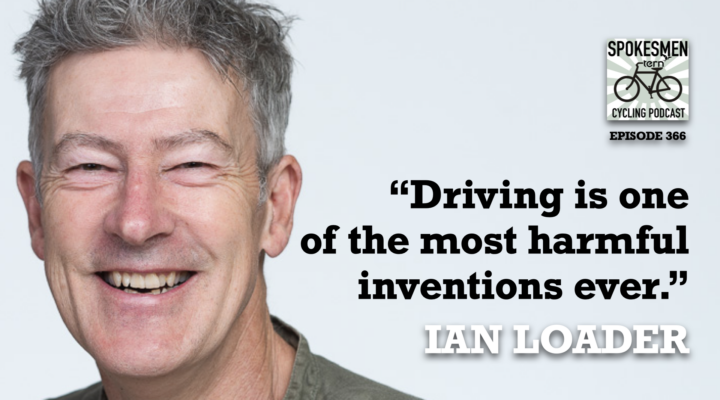
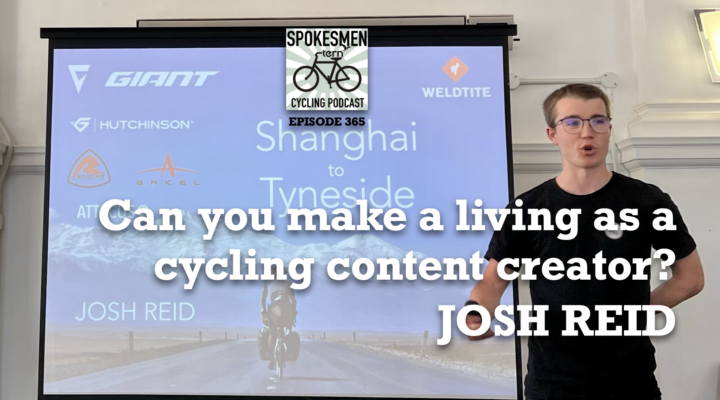
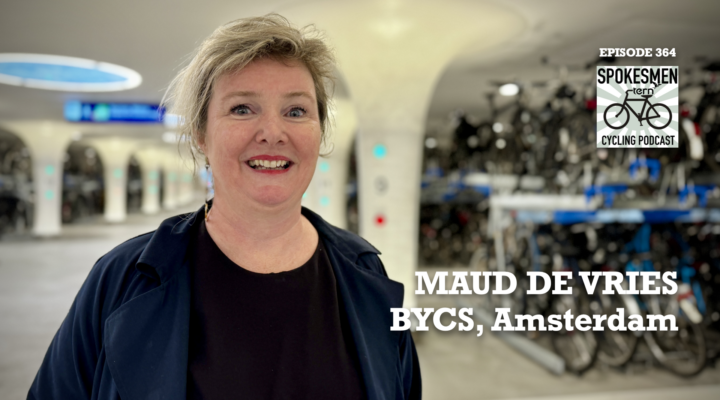
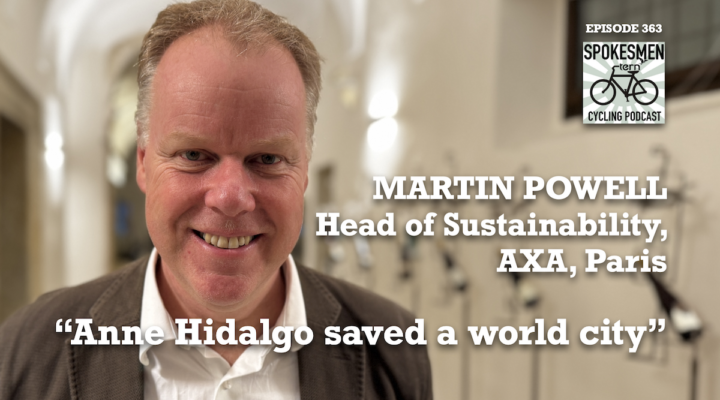
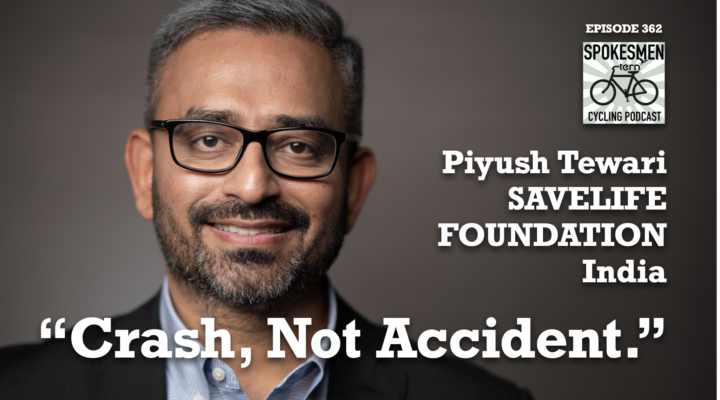
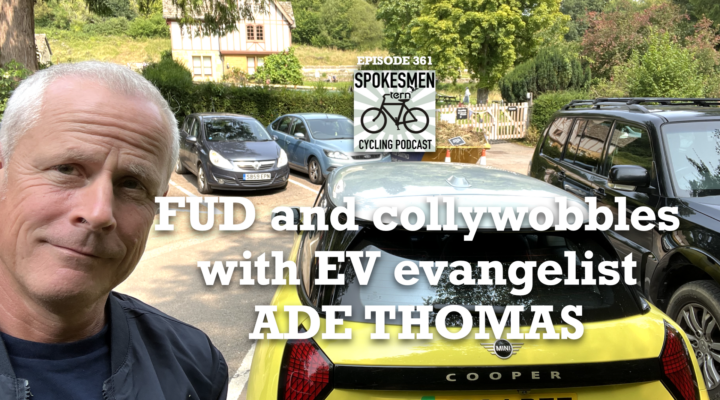
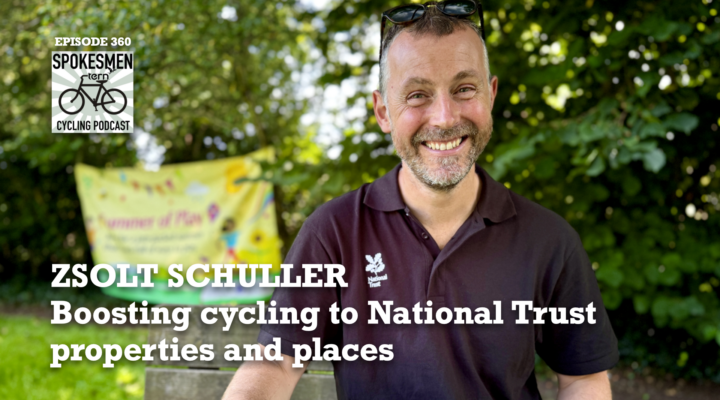
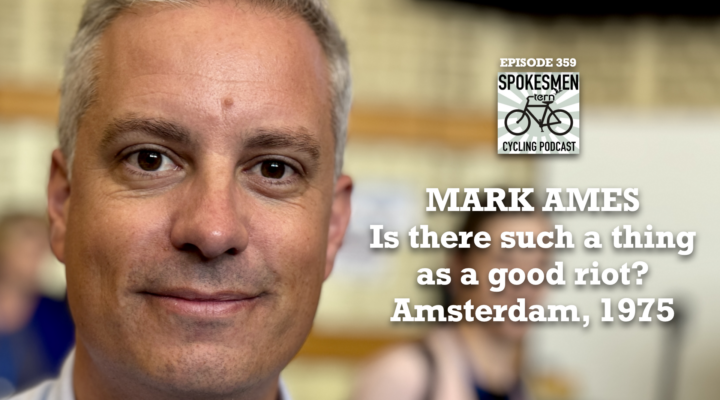
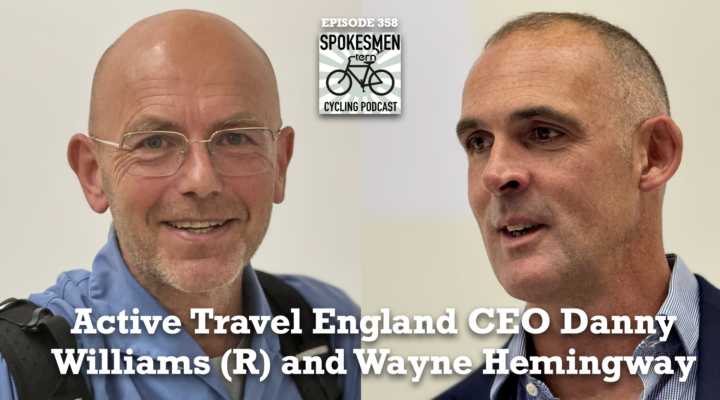
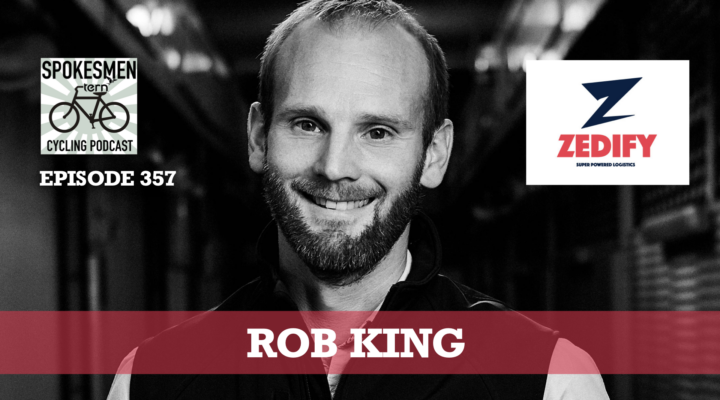
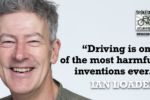


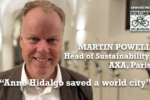
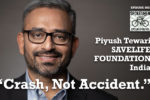


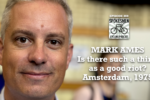


Be First to Comment